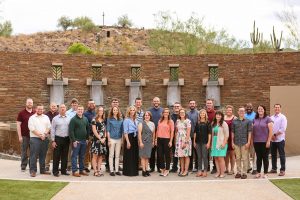Today, Christ’s Church of the Valley (Peoria, AZ) is known as one of the largest, most dynamic multi-site churches in the U.S. But during its initial expansion about a decade ago, the staff discovered a startling fact: ministry talent was in short supply, and those who enter vocational ministry do not stay. 85% of the ministry leaders who trained at our nation’s seminaries and Bible colleges left within their first five years.
“Staff longevity is a real challenge,” says CCV’s Senior Pastor Ashley Wooldridge. “Ministry is about the long game.”
That challenge impacts churches across the nation and the world, leading CCV’s leaders to form partnerships with Christian colleges across the U.S. to launch the CCV Leadership Institute in 2008.
Since then, the CCV Leadership Institute has trained hundreds of ministry leaders who are now serving in churches all across the country as teaching pastors, children or student ministry directors, sports ministry directors, small groups pastors, and worship leaders.
Young Leaders Need to Know Their Strengths
The Institute’s success, its directors believe, is rooted in its personalized approach that focuses not only skill building in each resident’s ministry area, but on his or her strengths, equipping leaders to sustain ministry for the long term.
The approach that starts during recruitment. The staff uses the Leading From Your Strengths (LFYS) profile each year as part of the application process for filling the program’s 40 available resident spots from a pool of 300 candidates.
“LFYS gives us a better idea of who the candidate really is,” says Rick Penny, CCV Director. “But more importantly, we use the information to help the candidate understand who they really are and how they can best interact with those that might be different from them.”
The profiles give clear data about the applicant’s emotional intelligence (EQ) – the ability to understand themselves and other people, and how to work cooperatively with them. “EQ will carry you in ministry,” says Steve Gross, who also serves on the Leadership Institute staff. “A strong EQ makes a ministry worker more effective in reaching people.”
LFYS was a natural choice for the Leadership Institute because the church already used the profile with its staff. It has proved to be a particularly good fit when training vocational ministry leaders for the long haul.
The Biggest Misconception Debunked For Ministry Leaders
Over and over, the profiles have revealed a recurring misconception among would-be ministry leaders: only the dynamic, outgoing, visionary personality is effective as a ministry leader. “We have had to work with more than a few candidates to help break that misconception,” says Rick. “LFYS has helped them embrace who God made them to be as a leader.”
Enrolled residents work with the Institute staff to assess the jobs, roles, and tasks they are considering in ministry and align those results along their profile data to understand where they can best fit to operate out of their strengths. Although the young leaders-in-training are still learning to understand their strengths and acquire the skills to apply them, the LFYS process provides a living laboratory for the resident to do so while working hands-on with CCV staff. Meanwhile, each CCV staff is acutely aware of their own profile data and each other’s, allowing them to model strengths and team blend.
“The Leadership Institute is committed to ‘growing’ who the residents are,” says Steve. “Not ‘changing’ who they are.” There is rarely a time when residents and CCV staff enter into a new area, task, assignment, or interaction without at least considering the profiles and how each resident’s data might come into play. “The awareness helps avoid a lot of misunderstandings, while bringing a bigger sense of fulfillment to the workplace,” says Rick.
“The Leadership Institute at CCV not only challenged and strengthened me as a ministry leader, but most importantly as a servant leader in Christ’s Kingdom,” said alumni Jomarie Manimtim Olander, who has since served in children’s ministry and as a campus coordinator. “I got to work alongside ministry leaders and staff members who really care about me as a person and who helped prepare me for a lifetime in ministry.”
When pastors and other ministry leaders are aware of their strengths, they can lead well from a place of confidence. “I cannot imagine a team leader operating without the Leading From Your Strengths profiles,” says Rick. “We have seen nothing but benefits from using them. To all leaders out there, I say give the profiles a shot.”
More About Developing Ministry Leaders
Leadership: Building Up Leaders Down Under
Leadership: A Tale of Two Leaders
Leadership: If a Tool Is Easy and Good, Why Not Use It?

